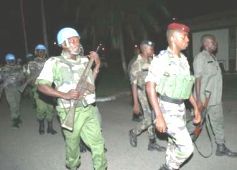Draft UN resolution would send peacekeepers to Sudan
By LEYLA LINTON, Associated Press Writer
UNITED NATIONS, Feb 15, 2005 (AP) — A draft U.N. resolution calls for a 10,000-strong U.N. peacekeeping mission to be sent to southern Sudan to help enforce a peace deal that ended the country’s 21-year civil war between the north and the south.

|
|
mixed patrol of Ivory Coast and U.N soldiers walk the streets in Abidjan, December 22, 2004. (Reuters). |
The Comprehensive Peace Agreement was signed in Nairobi, Kenya, on January 9 by the Sudanese government and the rebel Sudan People’s Liberation Movement/Army.
The resolution, drafted by the United States, would also authorize the peacekeepers, subject to approval by U.N. Secretary-General Kofi Annan, to assist the African Union mission aimed at resolving the separate conflict in Sudan’s western Darfur region.
It would also extend an arms embargo already in force in Darfur for both black African rebel groups and the Arab militia known as Janjaweed. The U.S. draft would widen the ban on arms sales to include Sudan’s government.
The U.S. draft, which was circulated among council members on Monday, also calls for an assets freeze and a travel ban on all those who impede the peace process, threaten the stability of Darfur, violate human rights or commit other atrocities.
The resolution would give the U.N. soldiers the mandate to protect civilians “under imminent threat of physical violence.”
It would require the Sudanese government to seek approval from a U.N. Security Council committee if it wishes to move military equipment into Darfur.
U.S. deputy ambassador Stuart Holliday said he expected a vote on the draft resolution within two weeks.
The resolution also demands that the Sudanese government honor its commitments under a ceasefire agreement with the Darfur rebels announced last April 8 in neighboring Chad’s capital of N’djamena, and stop offensive military flights over the Darfur region.
The two-year-old conflict in Darfur has forced more than 2 million people to flee their homes and left more than 70,000 dead, mainly from disease and hunger.
Earlier this month, a U.N. commission concluded that the Sudanese government and Arab militias carried out mass killings and probably war crimes in Darfur, but stopped short of labeling it as genocide.
The draft resolution declares that perpetrators of crimes should be “brought to justice througn internationally accepted means.”
However the resolution stops short of saying how the accused would be tried.
The United States opposes the world’s first permanent war crimes tribunal, the International Criminal Court in The Hague, and wants alleged perpetrators of war crimes in Darfur to be tried by a new tribunal based in Arusha, Tanzania.
However, the U.S. proposal for the Arusha tribunal has received little support. U.S. deputy ambassador Stuart Holliday told reporters Monday that exactly how and where those accused would be prosecuted would probably form part of another U.N. resolution.
The draft also stops short of calling for an oil embargo, saying that if parties continue to break the ceasefire the council will consider further measures including “actions relating to Sudan’s petroleum sector.”
In what Holliday called a “first”, the resolution also calls on U.N. Secretary-General Kofi Annan to set up a Personnel Conduct Unit within the mission to tackle any sexual exploitation or abuse by U.N. personnel. Some U.N. peacekeepers have been accused of sexual abuse while conducting various missions, particulary in Congo.
Under the draft resolution, the United Nations Mission in Sudan would be set up for six months initially and include 715 civilian police, as well as the 10,000 soldiers.
The deployment would help monitor the Jan. 9 peace deal in the south as well as provide humanitarian assistance to the millions of people displaced by that war, help demobilize child soldiers and tackle the problem of Sudan’s huge and largely unmarked mine fields.
The U.N. peacekeepers would also work closely with the African Union mission already under way in Darfur.
The peace agreement signed in Nairobi, Kenya, provides for the creation of a transitional government in which the former rebels, the Sudan People’s Liberation Army, will have several positions in the Cabinet. It provides for an eventual referendum on self-determination for southern Sudan after a six-year transitional period.
The north-south war broke out in 1983, and more than 2 million people died in the course of the conflict, mainly from war-induced famine and disease. The SPLA drew its support from the south’s Christian and animist peoples who resented rule by the Islamic-dominated Arab government in Khartoum.
The hope is that the Nairobi agreement could serve as a model for ending the conflict in Darfur, which began in February 2003 when two black African rebel groups took up arms against the Arab-dominated government in a bid to win more political and economic rights for the region’s African tribes people.
Sudan’s government is accused of responding to the rebellion by backing the Janjaweed — camel and horse-riding Arab militiamen — in a campaign of wide-scale abuses against Sudanese of African origin. The government, based in the capital, Khartoum, denies backing the Janjaweed.
